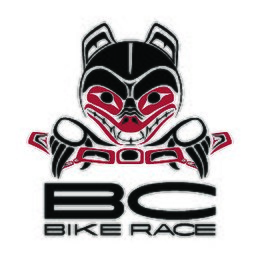Sarah Moore
Today
 Pinkbike Primer: Everything You Need to Know Ahead of the Araxá World Cup 2024
Pinkbike Primer: Everything You Need to Know Ahead of the Araxá World Cup 2024
Here is everything you need to know ahead of the second round of the 2024 XC World Cup.
Dario DiGiulio
Today
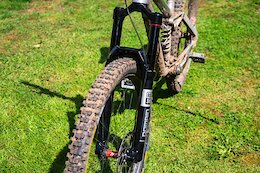 First Ride: The Sub-$600 RockShox Domain and Psylo Forks
First Ride: The Sub-$600 RockShox Domain and Psylo Forks
These low-cost alternatives to the Lyrik and Zeb might just be worth a second look.
Matt Beer
Today
 Review: Race Face's Era Chainring Uses Steel, Carbon, & Aluminum
Review: Race Face's Era Chainring Uses Steel, Carbon, & Aluminum
The new Era chainrings boast impressive durability at a light weight, but they don't come cheap.
Sarah Moore
Today
 Things We Learned from the State of the Sport Survey
Things We Learned from the State of the Sport Survey
Now that the dust has settled on the State of the Sport survey, we reflect on what we learned this year.
Mike Kazimer
Today
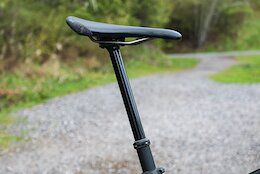 First Ride: Fox's New Transfer Dropper Post - Adjustable Travel, Up to 240mm of Drop
First Ride: Fox's New Transfer Dropper Post - Adjustable Travel, Up to 240mm of Drop
The Transfer gets a complete overhaul for 2025.
Outside Online
Apr 5, 2024
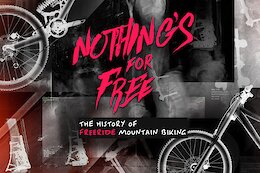
The iconic history of freeride will be available to own from April 23rd.
Cannondale Bikes
Today
 Video: Texas BBQ, Biking & Country Music with Mitch Ropelato in Season 3 of 'Mitch'n Out'
Video: Texas BBQ, Biking & Country Music with Mitch Ropelato in Season 3 of 'Mitch'n Out'
Mitch Ropelato kicks off season three by heading down south to take that all in, check out the local riding scene and even write his first country song!
Chromag Bikes
Today
 Chromag Announces 2024 Clothing Line
Chromag Announces 2024 Clothing Line
New pants and jerseys from Chromag for 2024.
TRPCyclingComponents
Today
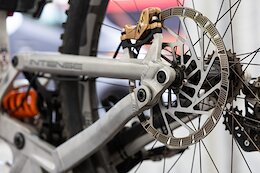 TRP Cycling Releases New S05E Race Rotor
TRP Cycling Releases New S05E Race Rotor
The rotor uses a new hole pattern which TRP says improves heat management.
iXS
Today
 iXS Announces New Hex Pull-Over Protector
iXS Announces New Hex Pull-Over Protector
iXS says their new back protector offers both high protection and great ventilation, making it suitable for the bike park or enduro races.
Mike Kazimer
Today
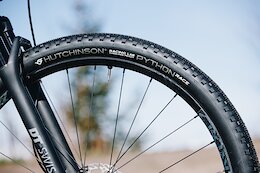 Hutchinson Releases New Python 3 & Python Race XC Tires
Hutchinson Releases New Python 3 & Python Race XC Tires
Two new fast-rolling options from the French tire specialists.
Sarah Moore
Today
 Gwendalyn Gibson Broke Collarbone in Crash at Mairiporã XC World Cup 2024
Gwendalyn Gibson Broke Collarbone in Crash at Mairiporã XC World Cup 2024
Gwendalyn Gibson had surgery in Brazil after a third lap crash.
Sarah Moore
Today
 5 Things We Learned from the Mairiporã XC World Cup 2024
5 Things We Learned from the Mairiporã XC World Cup 2024
Team USA had more success than ever before, the battle to secure two Olympic spots is on, and why it's harder for some people to make their country's Olympic team.
Ed Spratt
Apr 15, 2024
 Race Analysis: Elite XCO at the Mairiporã XC World Cup 2024
Race Analysis: Elite XCO at the Mairiporã XC World Cup 2024
The opening round of the 2024 XC World Cup provided incredible scenes as riders battled for race-winning glory and rare Olympic team spots.
Sarah Moore
Apr 15, 2024
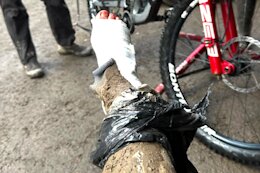 Tree Root Pierces Harriet Harnden's Foot at Round 1 of the British National Downhill Series
Tree Root Pierces Harriet Harnden's Foot at Round 1 of the British National Downhill Series
Harriet Harnden's foot clipped a root sticking out into the track and went though her shoe.
Digit Bikes
Today
 Digit Announces New Ring Trail Bike
Digit Announces New Ring Trail Bike
The Ring has 128mm of travel, a 140mm fork, and 29" wheels.
Ed Spratt
Apr 15, 2024
 XCO Photo Epic: Mairiporã XC World Cup 2024
XCO Photo Epic: Mairiporã XC World Cup 2024
The 2024 World Cup season starts in dramatic fashion.
Henry Quinney
Apr 15, 2024
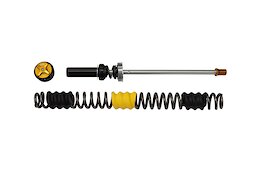 Ohlins Release RXF38 & DH38 Conversion Kits
Ohlins Release RXF38 & DH38 Conversion Kits
New spring cartridges are now available for Ohlins' DH and enduro forks.
 Help Support WMBC with the Fanatik $10K Shopping Spree
Help Support WMBC with the Fanatik $10K Shopping Spree
This fundraiser helps our non-profit organization, Whatcom Mountain Bike Coalition, fund a seasonal trail builder position and purchase a new excavator.
Ed Spratt
Apr 15, 2024
 Industry Digest: Crowd Funding 36" eBikes, Canfield Bikes' Relocation, Recalls & More
Industry Digest: Crowd Funding 36" eBikes, Canfield Bikes' Relocation, Recalls & More
What's going on in the cycling industry this month?
Alpinestars HQ
Apr 15, 2024
 Alpinestars Announces Spring 2024 MTB Collection
Alpinestars Announces Spring 2024 MTB Collection
New apparel, protection, and helmets from Alpinestars.
Ed Spratt
Apr 15, 2024
 Video: Official Highlights from the Mairiporã XC World Cup 2024
Video: Official Highlights from the Mairiporã XC World Cup 2024
An incredible start to the XC World Cup series in Brazil.
Ed Spratt
Apr 14, 2024
![[UPDATED] Final Elite XC Results & Overall Sta](https://ep1.pinkbike.org/p2pb20769079/p2pb20769079.jpg) [UPDATED] Final Elite XC Results & Overall Standings from the Mairiporã XC World Cup 2024
[UPDATED] Final Elite XC Results & Overall Standings from the Mairiporã XC World Cup 2024
The results are in from Brazil after some unmissable racing.
jennaalpkit
Apr 15, 2024
 Sonder Launches New Evol All-Mountain Bike
Sonder Launches New Evol All-Mountain Bike
The new Evol has 160mm of travel, mixed wheels, and revised geometry.
Scott Secco
Apr 14, 2024
 Movies For Your Monday - Jackson Goldstone, Remi Gauvin, Jess Blewitt, Scotty Cranmer. & More
Movies For Your Monday - Jackson Goldstone, Remi Gauvin, Jess Blewitt, Scotty Cranmer. & More
Another round of videos to start your week off right.
Ed Spratt
Apr 13, 2024
![[UPDATED] U23 XCO Results & Overall Standings](https://ep1.pinkbike.org/p2pb26491128/p2pb26491128.jpg) [UPDATED] U23 XCO Results & Overall Standings from the Mairiporã XC World Cup 2024
[UPDATED] U23 XCO Results & Overall Standings from the Mairiporã XC World Cup 2024
The U23 have kicked off the first XCO World Cup of 2024.
Ed Spratt
Apr 13, 2024
 Replay: U23 XC Racing from the Mairiporã XC World Cup 2024
Replay: U23 XC Racing from the Mairiporã XC World Cup 2024
The U23 XC World Cup racing is back for the first 2024 round in Brazil.
Ed Spratt
Apr 14, 2024
 XCC Photo Epic: Mairiporã XC World Cup 2024
XCC Photo Epic: Mairiporã XC World Cup 2024
The 2024 XC World Cup season kicked off with the intense 20-minute bar-to-bar blast of XCC racing.
Jack Fletcher
Apr 14, 2024
 Video: Grant Allen Absolutely Rips His Adaptive MTB for 'In Fantasia'
Video: Grant Allen Absolutely Rips His Adaptive MTB for 'In Fantasia'
Grant sends a road gap to cap it off.
Ed Spratt
Apr 13, 2024
 Elite XCC Highlights, Analysis & Results from the Mairiporã XC World Cup 2024
Elite XCC Highlights, Analysis & Results from the Mairiporã XC World Cup 2024
The Elite results are in from the first XCC World Cup of 2024.
Archive Navigator
2024 Advertiser List
Brands
Bikes
- Trek
- Specialized
- Devinci
- Rocky Mountain
- Giant Bikes
- Scott
- Kona
- Norco
- Commencal
- NS Bikes
- Santa Cruz
- Yeti
- YT Industries
- Polygon Bikes
- Cube
- Radon Bikes
- Marin
- Guerrilla Gravity
- RSD Bikes
- Propain Bikes
- DMR Bikes
- Canyon
- PRIME Bicycles
- Pivot Cycles
Components
- SRAM
- Shimano
- Race Face
- Industry Nine
- SDG
- Deity
- Hunt Wheels
- One Up Components
- KS
- Rotor Bike Components
- Stan’s NoTubes
- Reverse Components
- RideWrap
- PROLOGO
- Yoshimura Cycling
- TRP Cycling
- Galfer USA
- Bikeyoke
- e*thirteen
- Geo Handguards
Suspension
Tires
Accessories
Coaching and Education
Online Retailers
Resorts/Riding
- Trestle Bike Park
- Bike Parks BC
- Fernie
- Crested Butte
- Big White
- Saalbach Hinterglemm
- Whitefish Mountain Resort
- Visit Tucson
- Monument Trails
- Mountain Bike Park City





